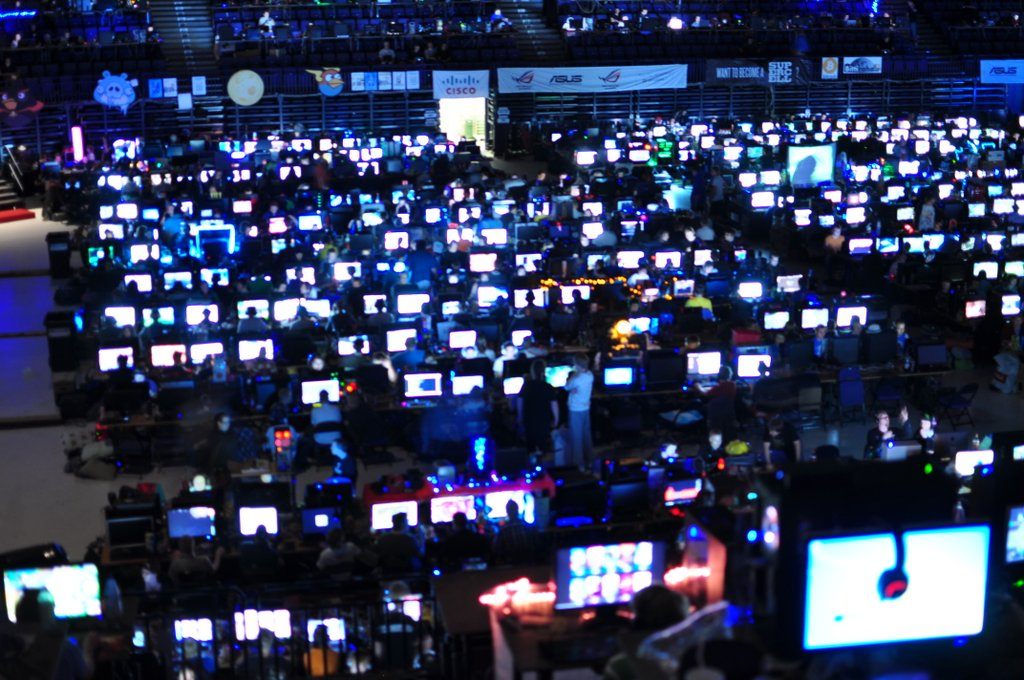According to Russia, Video Games are Definitely a Sport
The next time your mom tells you to go outside, refer her to the Kremlin.

Gamers participate in a 2012 eSports tournament. (Photo: Zone eSports/CC-BY-2.0)
Russian gamers, time to pop the champers and lock the door—there’s cause for celebration.
In an announcement released this week, the Russian Sports Ministry has recognized competitive video-gaming as an official sport in the country. While the decision may seem like a bid for the hearts and minds of basement-dwelling teens, competitive gaming—commonly referred to as eSports—is a fast-growing and financially lucrative industry, thanks to its ever-increasing popularity.
Russia is not the first country to embrace eSports. Competitive gaming is wildly popular in South Korea, and has been for years. In 2014, the New York Times covered a League of Legends tournament in Seoul that drew 40,000 spectators to an outdoor soccer stadium and offered a $1 million prize to the winning team. Around the globe, eSports competitors and enthusiasts consider South Korea the center of the professional gaming community, and according to some, the South Korean government’s early involvement—the Korean eSports Association (KeSPA) was established in 2000—played a key role in eSports’ growth and popularity.
“Pro gaming exists in its current form and size in large part thanks to the people who made it possible in South Korea,” Dutch pro gamer Manuel Schenkhuizen told the Times.
Sixteen years after KeSPA helped make eSports a mainstream phenomenon in South Korea, the popularity of eSports has spread around the globe. In 2015, Sports Illustrated featured a U.S. League of Legends tournament that brought 12,000 fans to Madison Square Garden, and the rise of streaming services like Twitch has grown the industry even further by allowing enthusiasts to watch tournaments from the comfort of their own home.
As eSports has grown, it’s gained many of the characteristics of traditional sports industries: anti-doping regulations, match-fixing scandals, Mark Cuban, and—as of last month—an official international oversight body. If a sport is defined by how seriously its players and fans take the competition, eSports are definitely a sport.
Of course, legitimacy isn’t the only motivator behind Russia’s official recognition of eSports. The industry is becoming a financial behemoth, with PwC estimating that eSports will generate nearly $500 million in revenue this year. According to the Los Angeles Times, “China’s richest man, Russia’s richest man, the U.S.’s fourth-richest man and a string of American multimillionaires” all have financial stakes in the industry. The Russian alluded to by the Times is Alisher Usmanov, who invested $100 million into Russian eSports club Virtus.pro last year, according to Russia Behind the Headlines. Industry insiders told RBTH that Russian eSports has potential for strong growth over the next few years. Becoming the second country in the world to officially recognize the competitions will certainly help.
But Russia’s official recognition of eSports isn’t just good news for the millionaires investing in the industry, who can now organize events in partnership with the Ministry of Sports. As explained by RT, eSports membership in the registry of sports means players can earn impressive official titles, such as “Master of Sports of Russia,” “Merited Master of Sports of Russia,” and “International Master of Sports.” It remains to be seen how many experience points are required for each title.







Follow us on Twitter to get the latest on the world's hidden wonders.
Like us on Facebook to get the latest on the world's hidden wonders.
Follow us on Twitter Like us on Facebook